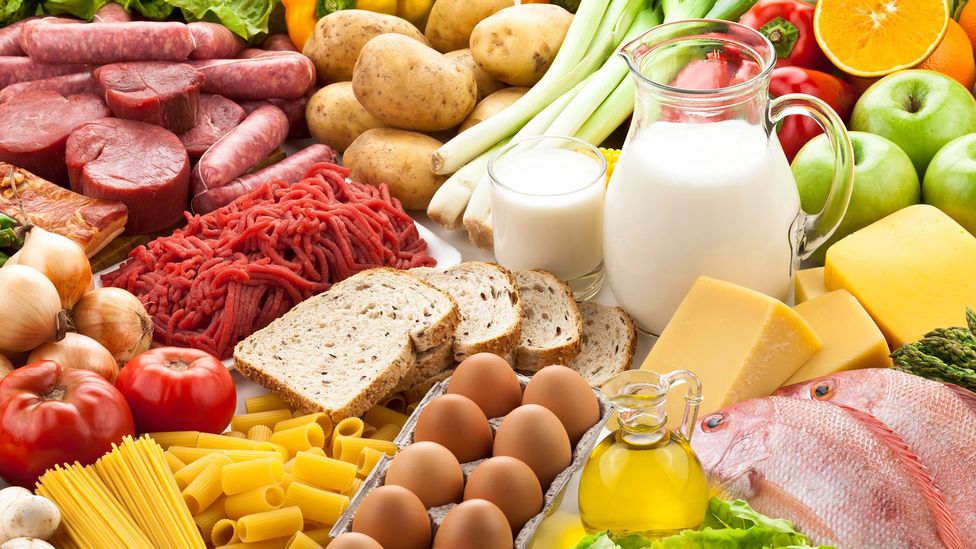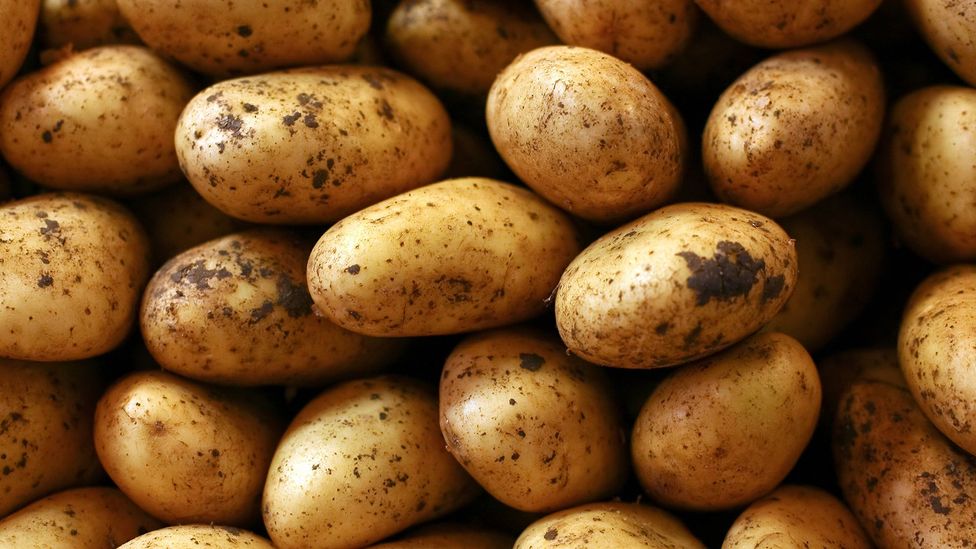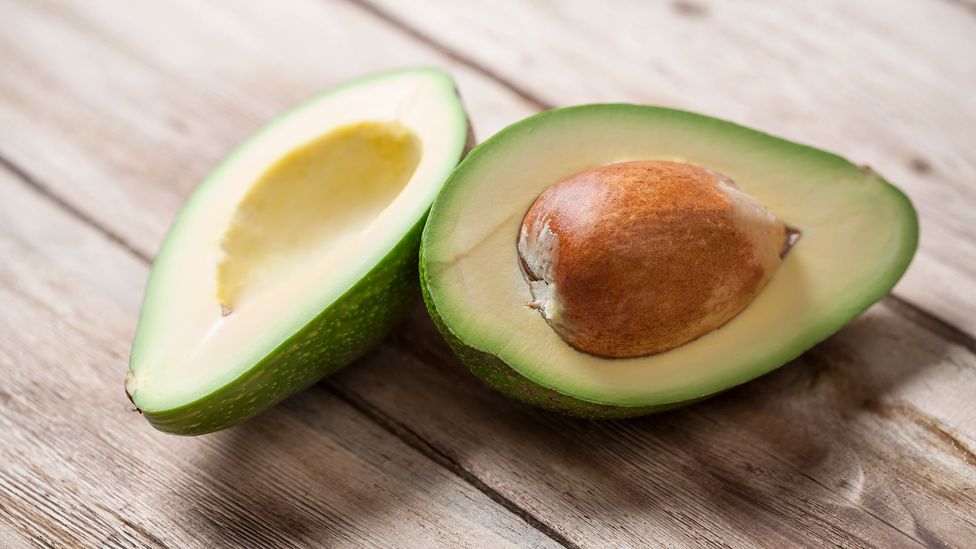Can I Watch Baby to Survive a Dino Blocks
Could you survive on just one food?

We're constantly told about the benefits of a varied diet. But what if you had to survive on just one food – what would you keep you alive the longest?
M
Man cannot live on bread alone – not least because man would develop scurvy about a month or so into that little experiment.
The best diets have plenty of variety in them, making sure you get everything from vitamin C to iron to linoleic acid without even having to think. Even fad diets that focus on just a few foods or on eliminating certain things are usually varied enough to be reasonably nutritious. Still, in the extremely unlikely scenario that you had to live on just one food, are some nutritionally more complete than others? Could you get what you need from, say, just potatoes, or just bananas, or just avocados?
One thing is for sure, the candidates would not include meat or most fruits and vegetables. Meat doesn't have fibre, nor does it have key vitamins and nutrients. Fruits and vegetables may have vitamins, but they don't have anywhere close to enough fat or protein, even eaten in quantity. The body does not need as much as you might think to stay alive, but you omit them at your peril.

Potatoes, it turns out, have plenty of protein as well as vitamins (Credit: iStock)
Arctic explorer Vilhjalmur Stefansson wrote about a phenomenon among the peoples of northern Canada called rabbit starvation, in which those who eat only very lean meat, such as rabbit, "develop diarrhea in about a week, with headache, lassitude, a vague discomfort." To avoid death from malnutrition, rabbit starvation sufferers must consume some fat, he writes. Jon Krakauer, in his book Into the Wild, suggests at first that ill-fated free spirit Chris McCandless died from rabbit starvation. It's thought that getting almost all one's calories from protein, and almost none from fat or carbohydrates, may overwhelm the liver's ability to process protein.
Still, if meat and most vegetables are off the table, somewhat surprisingly, potatoes are not as bad an option as you might think, says dietician Jennie Jackson of Glasgow Caledonian University. She wrote last year about Australian Andrew Taylor, who spent a year eating just potatoes as a well-publicised effort to lose weight and build healthier habits.
The thing that makes potatoes special is that for a starchy food, they have an unusual amount of protein, and that includes a wide variety of amino acids, says Jackson. Still, even eating 3kg (6.6lbs) of potatoes a day would only get up to about two-thirds of the recommended amount for someone of Taylor's size.
Potatoes also don't have the recommended amount of fat, and though Taylor included sweet potatoes, garnering him vitamins A and E, iron, and calcium, Jackson noted that B vitamins and zinc and other minerals would be in short supply. But he seems to have gotten through his year relatively unscathed. In fact, he lost quite a bit of weight.
As an aside, potatoes have a habit of coming up in these kinds of conversations. Some years ago a reader wrote to The Chicago Reader advice column, The Straight Dope, asked whether it was true you could live on just potatoes and milk. After all, it's been said that before the Irish Potato Famine, people there were living almost solely on potatoes. Cecil Adams, the erstwhile columnist, claims to have run the numbers with his assistant and found that a whole lot of potatoes and milk would get you most of what you need – with the exception of the mineral molybdenum. But you can get all you need of that by also eating a bit of oatmeal.

Avocados are packed with nutrients - but not as many as potatoes (Credit: iStock)
Hearing this, Jackson laughs. "Oh, that's our diet – that's the Scottish diet from a hundred years ago. That fits right in. Potatoes, milk, and oatmeal, with some kale in there, too."
But beyond pure nutrition, there are other barriers to narrowing one's diet to a single food. Humans have built-in mechanisms to avoid just such a situation (probably because it eventually leads to malnutrition) – specifically, a phenomenon called sensory-specific satiety: The more you eat of one thing, the less you can stomach it. "I call this the pudding scenario," says Jackson, "where you go out for a meal and you're stuffed, you couldn't manage another bite. And then someone brings out a pudding and you can manage a few more calories." There's the danger that eating the same thing day after day for a long time would make it more difficult to eat enough of it to keep you going. (Three kilos of avocado a day, anyone?)
Furthermore, the logic that it must be possible to eat a single-item diet rather than a varied one, and suffer no ill effects, as long as all the vitamin, mineral, and calorie boxes are checked, doesn't quite work out. To understand why, consider how we got our modern grasp of nutrition. Researchers in the early 20th Century deprived rats of certain nutrients and kept track of whether they got sick or died. This is how we learned about the existence of vitamins, for instance. It tells you what rats will die without, at least in the short term.

Rabbit meat contains such little fat that it can cause digestive problems (Credit: iStock)
However, it's likely that some of the health benefits of a varied diet — which play out in the long term — can't be picked up in reductive experiments like this, says Jackson. (And of course, humans are not rats.) Epidemiological data on people has made it clear that a variety of vegetables in one's diet is healthier than just a few, for instance, but it isn't exactly clear why.
Maybe a diet that includes no green vegetables means that somewhere down the line, you'll have a higher chance of developing cancer than you might have otherwise. "We don't really know which foods are causing which effects," Jackson says. "So while you could work out what exactly you needed from macro nutrients, you won't know exactly what you might be missing."
Cutting down your daily diet to just one ingredient might save time and hassle, but it'd be a quick way to get ill as well as bored.
Join 800,000+ Future fans by liking us on Facebook , or follow us on Twitter .
If you liked this story, sign up for the weekly bbc.com features newsletter , called "If You Only Read 6 Things This Week". A handpicked selection of stories from BBC Future, Earth, Culture, Capital, and Travel, delivered to your inbox every Friday.
Can I Watch Baby to Survive a Dino Blocks
Source: https://www.bbc.com/future/article/20170224-what-food-would-keep-you-alive-the-longest
0 Response to "Can I Watch Baby to Survive a Dino Blocks"
Post a Comment